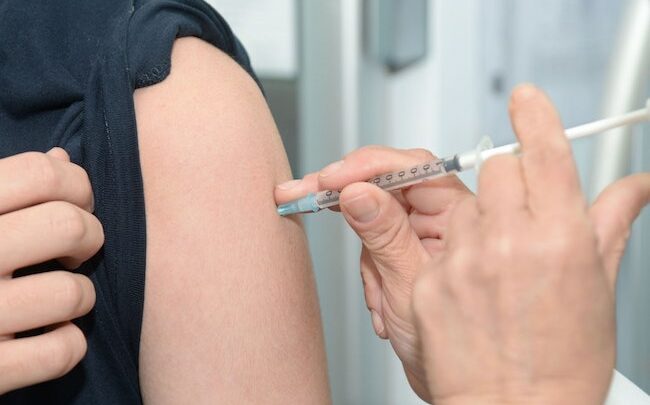
By Carrie B. Dolan, Ph.D.
Outside my window in Virginia, the pandemic looks as good as done. A swim team practices in the pool. A food truck sells jerk chicken to a never-ending line.
Across the globe, fewer than 2% of people in Africa are vaccinated against the novel coronavirus. COVID-19 is surging in poorer parts of the world, where its persistence amid low vaccination rates means the disease is far from finished.
This devastating discrepancy isn’t just the story we already know — that is, how poor countries fall victim to disease. It’s also a story of inflexible public health practices that have failed too many — and threaten to trap us all in a never-ending pandemic.
As world leaders convene this week for the G7 Summit in the U.K., they must recognize we’re already repeating the mistake of last summer, when uniform policies to contain COVID-19 yielded tragically uneven results. This time we’re committing the sin with vaccine delivery, which authorities are rolling out with another broad brush. Without more targeted distribution, we risk enabling new, contagious viral strains that could undermine health safeguards everywhere.
Data illustrate the danger. The same shutdown orders, stay-home rules and travel restrictions that stalled infection in wealthier communities helped the virus flourish in lower-income ones, according to findings at the William & Mary Global Research Institute.
Led by the Ignite Global Health Research Lab, our new study in the journal Health Policy and Planning compared the effectiveness of COVID-19 containment and closure policies in richer and poorer countries. By imposing those rules as a one-size-fits-all solution, leaders across the world put lower-income countries at risk for worsening poverty and higher death rates.
Predictably, the analysis of over 100 countries turned up a greater proliferation of COVID-19 in poorer countries. Crucially, it revealed people in those countries didn’t — and couldn’t — follow public health pronouncements with the consistency seen in moneyed regions.
Consider: When the health community pressed people to stay home, people in richer countries complied more often, the research shows. The pattern was especially pronounced in travel for retail and recreation, which dipped an estimated 22.7 percentage points in upper-middle-income countries.
In low-income countries, by contrast, the decline was just 9.3 percentage points. Poorer nations didn’t have the luxuries of Instacart, DoorDash and home offices that let so many in the Western World stay bound to their homes.
What’s more, lockdown orders in low-income countries would starve the lowest-income families, who worried about running out of food or water as supply chains crumbled under border closures, lockdowns and curfews. For those families, adhering to shelter-in-place orders was, and often remains, hardly an option.
Or take social distancing, that cornerstone of COVID-19 prevention. In cities like Cape Town, Mexico City and Nairobi, maintaining a six-foot circle of safety can be impossible. Leaving home is inevitable, even necessary for survival.
So now that we know what doesn’t work, what must change to spark a new direction for vaccines?
First, policymakers at every level need a gut check. We’re beyond the pandemic’s initial scare. We no longer are grabbing ready-made rules from the pandemic library, applying them anywhere and hoping they’ll work.
Instead, leaders must spend time and money developing fair vaccine-delivery plans tailored for individual countries and communities. The goal of vaccine distribution is simple: to ensure people who need them the most can access free or low-cost vaccines so they may live active and productive lives.
Ensuring that vaccines reach the neediest people, however, is complex, because resources are limited.
This is how we do it: Account for place-based differences in our approach. Vaccine distribution in a town with high vaccination rates and work-from-home habits, for instance, will differ dramatically from needs in an under-resourced, rural village with a labor-driven workforce.
Pressing forward, public health authorities must understand and adjust for place-specific differences in what stops the virus. They must evaluate local and regional economic conditions, aid distribution and a lot more before setting or recommending a strategy.
And they must determine where vaccination sites should be located to reach people with the most need. Further, leaders must invest in research and tools to make such assessments possible and effective. It’s essential that any federal relief support this work.
At the G7, broadening vaccine access will be at the heart of the agenda. No rollout plan will be perfect, but it’s crucial that any international campaign evaluate and incorporate these nuances of place.
If leaders step up, we’ll safeguard more lives here and across the world. Without a global commitment to targeting vaccines to the greatest need, uniform practices will deepen the divide between wealth and poverty, leave poorer countries vulnerable and perpetuate the worldwide cycle of the pandemic.
It won’t be over anywhere until it’s over everywhere.
Carrie B. Dolan is an assistant professor of health sciences and director of the Ignite multidisciplinary research lab in the William & Mary Global Research Institute. She is a co-author of the paper “The effectiveness of national-level containment and closure policies across income levels during the COVID-19 pandemic: an analysis of 113 countries,” published in May in the journal Health Policy and Planning.




